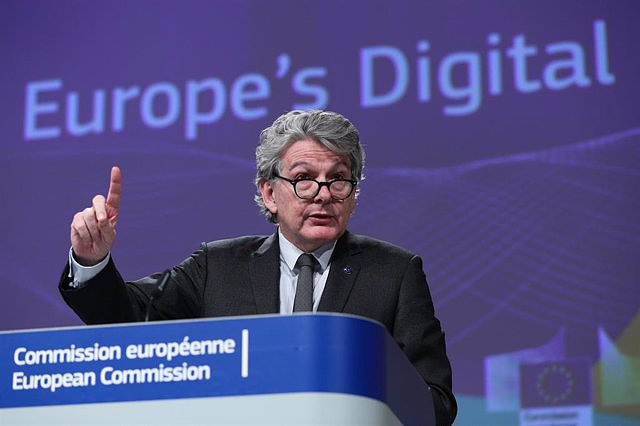A few minutes before the end of this Friday, after more than 35 hours of negotiation, the European Union has managed to close a historic agreement to establish the first rules with which to limit the risks of Artificial Intelligence (AI) that may foreseeably come into force. starting in 2026.
"We have achieved the first international regulation of Artificial Intelligence in the world, we feel very proud," celebrated the Secretary of State for Digitalization and Artificial Intelligence, Carme Artigas, who has traveled to Brussels to lead the Council's negotiating team these days, in so much so that the Spanish presidency in turn.
The negotiators of the European Parliament, the European Commission and the Council (governments) began on Wednesday what was called to be the last round of negotiation for an agreement that was finally not reached until late on Friday, after overcoming the last obstacles regarding the biometric surveillance and its use by security forces.
The standard offers a risk-based approach that categorizes risk levels and accompanying restrictions based on scale, implying prohibition in cases of "unaffordable" risk, such as biometric categorization systems, non-removal targeted images to create databases for facial recognition, emotion recognition, social scoring systems or systems that manipulate behavior.
However, a series of strict exceptions are foreseen that will allow the use of biometric surveillance systems in public spaces, as long as there is a prior court order and for a list of strictly defined crimes.
In this way, real-time biometric monitoring will be limited in time and location and only for the selective search of victims of kidnapping, trafficking or sexual exploitation, to avoid a specific and present terrorist threat and to locate or identify a suspect of having committed a crime included in the law.
The European Parliament came with a long list of prohibited uses, but the Council pressed for some of the indicated systems not to be banned from the outset but rather to be classified as high risk and to adjust the restrictions. Artigas has defended that this change "does not mean that you can do whatever you want" because with the move to the high-risk category it is also accompanied by strict safeguards such as the precondition of having a court order for its use or having evaluations of impact on fundamental rights.
AI systems authorized but considered very high risk due to their significant impact on health, safety, fundamental rights, the environment and the rule of law are also defined.
Artificial Intelligence systems used to influence the outcome of elections and voter behavior are also classified as high risk, and citizens will have the right to file complaints and receive explanations about decisions based on high-risk AI systems. that affect their rights.
Another key has been how to introduce specific rules for foundational models, such as the ChatGPT or DALL-E platforms, which came to light after the European Commission presented its first regulation proposal, so this chapter has been developed in the course of the negotiation.
The pioneering legislation also provides for sanctions for non-compliance that will range from 35 million euros or 7 percent of global turnover to 7.5 million, depending on the size of the company.
The objective of the new European regulation is to establish security standards and fundamental rights that prevent technology from being used for repressive, manipulative or discriminatory purposes; but without it translating into hyperregulation that hinders the competitiveness of the European Union.
HISTORICAL AGREEMENT
The President of the European Parliament, Roberta Metsola, immediately reacted on social media to celebrate the "historic moment" because the EU will have "avant-garde, responsible, comprehensive legislation that will set global standards."
Meanwhile, the head of the community Executive, Ursula von der Leyen, has highlighted that this is a legal framework that will allow "the development of an Artificial Intelligence that can be trusted."
"Agreement!", the Commissioner for Industry and Digital Services, the French liberal Thierry Breton, wrote on social networks, along with a graphic to highlight that the European Union is the only region in the world with a regulation. After the political agreement reached this Friday, the new regulations still need formal adoption by the Council and the plenary session of the European Parliament to become law.
"We did it!", celebrated, for her part, the vice president of the European Commission in charge of rule of law, Vera Jourova, who, recalling the result of a test she did in recent days with ChatGPT, has celebrated that the new Artificial Intelligence Law be "the gatekeeper at the innovation party that lets in only the coolest, safest and most responsible AIs."

 Exploring Cardano: Inner Workings and Advantages of this Cryptocurrency
Exploring Cardano: Inner Workings and Advantages of this Cryptocurrency Seville.- Economy.- Innova.- STSA inaugurates its new painting and sealing hangar in San Pablo, for 18 million
Seville.- Economy.- Innova.- STSA inaugurates its new painting and sealing hangar in San Pablo, for 18 million Innova.- More than 300 volunteers join the Andalucía Compromiso Digital network in one month to facilitate access to ICT
Innova.- More than 300 volunteers join the Andalucía Compromiso Digital network in one month to facilitate access to ICT Innova.-AMP.- Ayesa acquires 51% of Sadiel, which will create new technological engineering products and expand markets
Innova.-AMP.- Ayesa acquires 51% of Sadiel, which will create new technological engineering products and expand markets Khan is re-elected mayor of London and underpins Labor's victory in local elections
Khan is re-elected mayor of London and underpins Labor's victory in local elections Felipe VI swears the flag again 40 years later at the AGM with Princess Leonor as a witness
Felipe VI swears the flag again 40 years later at the AGM with Princess Leonor as a witness Freixenet and unions agree to reduce working hours by 20-50% this year due to the drought
Freixenet and unions agree to reduce working hours by 20-50% this year due to the drought STATEMENT: Nearly 400 people participate in the II Family Support Conference at UIC Barcelona
STATEMENT: Nearly 400 people participate in the II Family Support Conference at UIC Barcelona How Blockchain in being used to shape the future
How Blockchain in being used to shape the future Not just BTC and ETH: Here Are Some More Interesting Coins Worth Focusing on
Not just BTC and ETH: Here Are Some More Interesting Coins Worth Focusing on A sensor system obtains the fingerprint of essential oils and detects if they have been adulterated
A sensor system obtains the fingerprint of essential oils and detects if they have been adulterated Faraday UPV presents the 'Origin' rocket to exceed 10 km of flight: "It is the beginning of the journey to space"
Faraday UPV presents the 'Origin' rocket to exceed 10 km of flight: "It is the beginning of the journey to space" The Generalitat calls for aid worth 4 million to promote innovation projects in municipalities
The Generalitat calls for aid worth 4 million to promote innovation projects in municipalities UPV students design an app that helps improve the ventilation of homes in the face of high temperatures
UPV students design an app that helps improve the ventilation of homes in the face of high temperatures A million people demonstrate in France against Macron's pension reform
A million people demonstrate in France against Macron's pension reform Russia launches several missiles against "critical infrastructure" in the city of Zaporizhia
Russia launches several missiles against "critical infrastructure" in the city of Zaporizhia A "procession" remembers the dead of the Calabria shipwreck as bodies continue to wash up on the shore
A "procession" remembers the dead of the Calabria shipwreck as bodies continue to wash up on the shore Prison sentences handed down for three prominent Hong Kong pro-democracy activists
Prison sentences handed down for three prominent Hong Kong pro-democracy activists ETH continues to leave trading platforms, Ethereum balance on exchanges lowest in 3 years
ETH continues to leave trading platforms, Ethereum balance on exchanges lowest in 3 years Investors invest $450 million in Consensys, Ethereum incubator now valued at $7 billion
Investors invest $450 million in Consensys, Ethereum incubator now valued at $7 billion Alchemy Integrates Ethereum L2 Product Starknet to Enhance Web3 Scalability at a Price 100x Lower Than L1 Fees
Alchemy Integrates Ethereum L2 Product Starknet to Enhance Web3 Scalability at a Price 100x Lower Than L1 Fees Mining Report: Bitcoin's Electricity Consumption Declines by 25% in Q1 2022
Mining Report: Bitcoin's Electricity Consumption Declines by 25% in Q1 2022 Oil-to-Bitcoin Mining Firm Crusoe Energy Systems Raised $505 Million
Oil-to-Bitcoin Mining Firm Crusoe Energy Systems Raised $505 Million Microbt reveals the latest Bitcoin mining rigs -- Machines produce up to 126 TH/s with custom 5nm chip design
Microbt reveals the latest Bitcoin mining rigs -- Machines produce up to 126 TH/s with custom 5nm chip design Bitcoin's Mining Difficulty Hits a Lifetime High, With More Than 90% of BTC Supply Issued
Bitcoin's Mining Difficulty Hits a Lifetime High, With More Than 90% of BTC Supply Issued The Biggest Movers are Near, EOS, and RUNE during Friday's Selloff
The Biggest Movers are Near, EOS, and RUNE during Friday's Selloff Global Markets Spooked by a Hawkish Fed and Covid, Stocks and Crypto Gain After Musk Buys Twitter
Global Markets Spooked by a Hawkish Fed and Covid, Stocks and Crypto Gain After Musk Buys Twitter Bitso to offset carbon emissions from the Trading Platform's ERC20, ETH, and BTC Transactions
Bitso to offset carbon emissions from the Trading Platform's ERC20, ETH, and BTC Transactions Draftkings Announces 2022 College Hoops NFT Selection for March Madness
Draftkings Announces 2022 College Hoops NFT Selection for March Madness
























